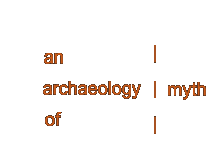|
|
 metaphor metaphor
Immersed in metaphor, we attempt to become more conscious
of them, those we use and those we abhor, those we adopt consciously
and those half-buried in our thinking and consciousness. We need
metaphors, and we need to know how to use them, how they use
us, and how we acquire new metaphors as we outlive old ones.
Metaphors make a difference. They help us translate the everyday, prosaic
elements of life and profession into a world
with personal and transcendent meaning. When our metaphors don't work,
we are in trouble.
We use metaphor when description, explanation, and theory fall short.
A metaphor moves toward meaning by circling around definition, description
and explanation. When a direct and accessible route to meaning is blocked,
we turn to metaphor. With metaphor we confront stale conventions and stunted
ways of thinking with imaginative new mental pictures. Metaphors, according to the literary
critic William Gass, are "a manner of inferring," a way of
showing or presenting. "Showing argues and showing produces acquaintance.
It presents to the mind one thing in order that the mind may seem to have
possession of another." [William H. Gass, Fiction & Figures of Life 63, 64
(Boston: Nonpareil Books, 1971)]. Metaphors are at once practical
and necessary, yet ever playful in the craft of language.
"[W]e may reveal more of ourselves by our . . . metaphors
than by statements and sayings that are the products of more
calculated deliberation. Insofar as metaphors are privy to our
most profound thoughts and experiences, they may tap into cultural
or personal truths of which we are not at first aware, and into
notions which we may not even approve." [Bernard J. Hibbits,
Making Sense of Metaphors: Visuality, Aurality, and the Reconfiguration
of American Legal Discourse, 16 Cardozo L. Rev. 229, 236
(1994)]
We are unconscious about metaphor, as so much else goes on around us.
We are inattentive to and uninformed about the metaphors we use and the
way they deplete our energies even as we vigorously embrace them. We are
even less aware of how metaphor points to and hints at the myth in our
work and our lives.
Metaphor takes us to the margins of language, where, by translation,
an equivalence of the incommensurable is made possible. Metaphor
creates and transforms; it contains the mythic energy of language.
"[T]he circumlocution of one idea in terms of another, rests
on quite definite notions arising from the magic view of the
world. . . ." [Ernst Cassier, The Myth of
the State 87 (New Haven: Yale University Press, 1946)]
"Language and myth stand in an original and indissoluble
correlation with one another, from which they both emerge but
gradually as independent elements. They are two diverse shoots
from the same parent stem, the same impulse of symbolic formulation,
springing from the same basic mental activity. . . ." [Cassier, at 88]
The transformational power of language is an opening into
myth. Myth, like metaphor, is a way of thinking about one order
of things in terms of a different order. With myth
we amplify our understanding
of the prosaic, everyday lives we live. Conventional, everyday
thinking gets mired down, confined to ruts. Myth permits a way
of thinking about what we mortals mean in terms of the stories of the gods we are
not.
Law is presented to students as a form of practical problem-solving,
as a method of locating authoritative legal rules that can be
used on behalf of clients to further their interest, as we further
our own. Consequently, lawyers often view themselves as pragmatic
realists. This stance, rooted in the reality of law work, takes
no account of the way lawyers
live in a magical world of
law where liens float, corporations reside, minds hold meetings,
and promises run with the land. The constitutional landscape
is dotted with streams, walls, and poisonous trees. And these
wonderful things are cradled in the seamless web of law.
This cannot be magic; we know better than that. It is
merely metaphor. We all know what we mean when we say "floating
lien." It is just a figure of speech. We choose our metaphors.
We create for them our chosen meanings. We understand them; we
master them.
But this standard sense of metaphors is too pat, too comfortable.
Our metaphors are truly magical in their mystery and power. We do not
simply choose them. We do not fully understand how we get meaning from
them. We are neither their master nor their servant. Their power is the
power to shatter and reconstruct our realities.
[Thomas Ross, Metaphor and Paradox, 23 Geo. L. Rev. 1053 (1989)]
 disciplines disciplines
|
